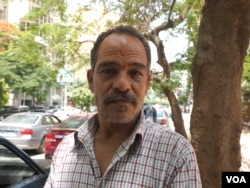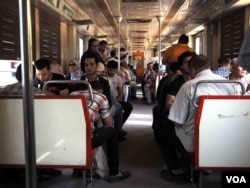Forty-year-old Ahmed has spent much of his life trying to become male. In his white taxi parked under a bridge in Cairo, he is despondent, saying that without the final operation that will transform him fully from a woman to a man, he expects his fiancée will break their engagement within a year.
Outwardly all male, Ahmed says for him, the idea of living as a woman is the same as the idea of not living at all.
"The day I had my first surgery, my family was all around me," he explained. "I was happy and laughing and I told them, ‘I'm going into surgery so I can live.'"
As a transgender Egyptian, Ahmed lives in the only Arab country that offers free surgeries for people diagnosed with Gender Identity Disorder, as it is known here. However, the government stopped issuing permits for the surgery in recent months.
After 15 years of hormones and surgical and psychological treatments, Ahmed is now stuck in limbo, almost entirely physically a man, but not quite. Meanwhile, the committee that decides who is eligible for gender reassignment surgery in Egypt is locked in a debate about the morality of the operations.
WATCH: One transgender man talks about his life in Egypt
Ahmed says the stalled permit process has left him desperate, as he tries to convince hospitals or private clinics to complete his transformation. After dozens of visits to one hospital to plead his case for an exception to the ban, one doctor promised to perform his third operation early last month.
"I thought in a few days this nightmare would be over," Ahmed said. "But at the hospital I ran into the doctor. He said, ‘I forgot to tell you. We cannot do the surgery.'"
The committee
For the general public in Egypt, official reservations about gender reassignment operations are well-founded, with many people saying the practice is sinful.
"Certainly this will never work in our community," said Said Mohamed Mazen, a 52-year-old driver sipping a soda in the streets on a steamy Cairo afternoon. "God created us. A man is a man, and a woman is a woman."
When the subject is presented as a medical issue, Mazen softens his stance, saying it is possible doctors know best.
Some Western activists argue that saying transgender people have a mental disorder is demeaning, but doctors here say they believe it is a medical problem, with a medical solution. And it's for this reason that the formerly taboo practice is now state-sponsored, explains Dr. Mohammed Abdou Abdel-Rassoul, a surgeon who performs gender reassignment operations.
Both Muslim and Christian clerics in Egypt have, in the past, approved transgender operations as a medical necessity, yet many people still "falsely" believe it to be sacrilegious, he adds.
"Definitely, nobody wants to do this kind of heroic surgery except when there is a very big drive," he said.
Questions about the morality of gender reassignment operations were reintroduced to the permit committee a few months ago because renewed public debate on the issue was making religious authorities reluctant to hand out permits, according to committee chair Dr. Osama Abdelhay.
The committee is made up of mostly doctors and a representative from Al-Azhar, Egypt's most prestigious Islamic institution. Approval from Al-Azhar is important, he adds, because it helps transgender people convince their loved ones to support their choices and society at large to accept its small transgender population.
IDs and arrests
Ahmed, the taxi man waiting for his final operation, has an identification card that matches his appearance.
This, however, is often not the case, says Dalia Abd Elhameed of the Egyptian Initiative for Personal Rights. Many transgender people cannot change their names and genders legally after their surgeries. Without gender-matching IDs, those people are forced to stay home or appear at work as if they were still the gender they were born to, she says.
"It's very indicative of the fact that different entities in Egypt don't talk to each other," she said. "It can't be that you are in a country where the government actually subsidizes these kinds of surgeries and then the police and the judiciary of the same government would refuse to change the papers of these people."
Ahmed is also not subject to many other social abuses commonly inflicted upon the transgender community in Egypt, because he looks like an ordinary man. Still, he asks that his real name and identifying features not be included in this article.
Ridicule and abuse are more commonly inflicted upon transgender women, Ahmed says, recalling a young man being mocked publicly before he transformed into a woman.
"They were laughing because of his feminine features and soft voice," he said. "Everyone else laughed, but I cried."
Transgender women are also more likely to get caught up in crackdowns on gays, adds Elhameed. Homosexuality is not explicitly illegal in Egypt as it is in much of the region, but laws forbidding debauchery have been used to arrest and imprison gay people.
In recent years, she adds, authorities have become adept at catching homosexual activity using social media, and transgender women are often mistakenly conflated with gay people.
"They arrest them," she said, "giving them prison sentences that might be as harsh as 11 or 12 years in prison, with the accusation of habitual debauchery."
Transgender restrooms
As the debate in the United States rages over whether transgender individuals should be allowed to use public restrooms of their choice, activists in Egypt say it is hardly an issue here.
For starters, says Elhameed, transgender men and women in Egypt take extreme care to appear as their gender of choice for their own safety.
And most of those in Egypt's small transgender population are a long way from claiming rights publicly, preferring to inform as few people as possible about their status, according to Abdelhay.
The U.S. debate, however, may eventually provide a solution for other countries, he adds, on what to do when human rights and community wishes clash — a complex issue in any nation.
"How [do we] respect our beliefs and our communities in Egypt," he asked, "and at the same time give these people the right to do anything. To go to school. To go to toilets."
VOA’s Hamada Elrasam contributed to this report.




